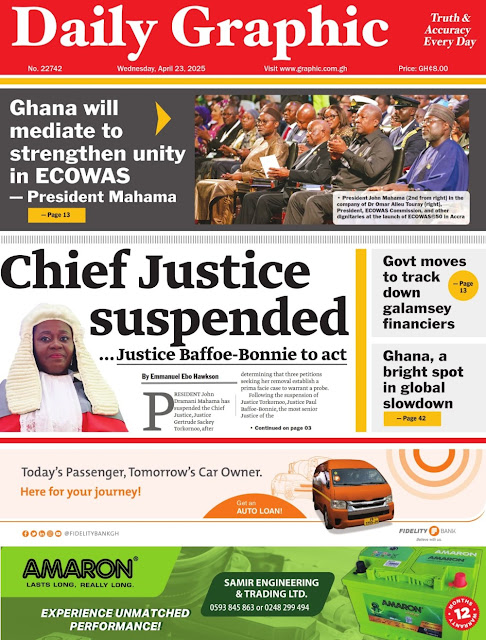TODAY'S TOP NEWSPAPER HEADLINES - APRIL 23
President John Dramani Mahama has suspended Chief Justice Gertrude Sackey Torkornoo after determining that three petitions calling for her removal established a prima facie case warranting an investigation. Following her suspension, Justice Paul Baffoe-Bonnie, the most senior Justice of the Supreme Court, will act as Chief Justice. This action is in accordance with Article 144(6) of the 1992 Constitution, which permits the most senior Justice of the Supreme Court to assume the role of Chief Justice when the position becomes vacant or when the substantive Chief Justice is unable to perform their functions—in this case, due to Justice Torkornoo's suspension.
President Mahama's decision to suspend the Chief Justice marks a first in the country’s governance system. The suspension followed the Council of State's determination of a prima facie case and the establishment of a five-member committee to investigate the petitions, in accordance with Article 146(6) of the 1992 Constitution. Article 146(10) allows the President, acting on the advice of the Council of State, to suspend the Chief Justice when a committee is formed to probe the petitions.
A statement issued by Felix Kwakye Ofosu, the Spokesperson to the President and Minister of Government Communications, noted, “Pursuant to Article 146 (10) of the Constitution and following the advice of the Council of State, the President has, by a warrant, suspended the Chief Justice with immediate effect pending the outcome of the committee’s proceedings.”
The five-member committee established by President Mahama to investigate the petitions will be chaired by Justice Gabriel Scott Pwamang. The other committee members include Justice Samuel Kwame Adibu-Asiedu, a former Auditor-General Daniel Yaw Domelevo, Major Flora Bazwaanura of the Ghana Armed Forces, and Professor James Sefah Dzisah from the University of Ghana.
Historically, while there have been several attempts to remove a Chief Justice in the country, this is the first time under the Fourth Republic that a President has invoked Article 146(10) of the Constitution to suspend a Chief Justice facing impeachment proceedings. Indeed, this is also the first time a petition for the removal of a Chief Justice has passed the prima facie determination to warrant a committee's formation for inquiry.
In 1995, the Ghana Bar Association filed a writ at the Supreme Court challenging then-President Jerry John Rawlings' nomination of Justice Isaac Kobina Abban as Chief Justice, citing a lack of high moral character or proven integrity. However, the Supreme Court dismissed the suit after the Attorney-General raised a preliminary objection, asserting that the removal process was a political matter reserved for the President and the Council of State under Article 146.
In 2006, a petition was filed to remove then-Chief Justice Justice George Kingsley Acquah, but it failed after the Supreme Court ruled in the case of Frank Agyei Twum vs. Attorney-General that the President had violated Article 146(6) by forming a committee to probe the petition without establishing a prima facie case in consultation with the Council of State.
Read also: Sarkodie endorses rising rap sensation bepor keddi in viral ga freestyle moment
Read also: Igp takes action in galamsey zones with command reshuffle
In 2024, President Nana Addo Dankwa Akufo-Addo declined to facilitate the removal process after receiving a petition from constitutional lawyer Prof. Kwaku Asare regarding Justice Torkornoo.
Article 146 of the Constitution stipulates that a Justice of the Superior Courts can only be removed from office “for stated misbehavior or incompetence or on grounds of inability to perform the functions of their office arising from infirmity of body or mind.” This article governs the removal process for Justices of the Superior Courts, the Chief Justice, and other analogous positions, such as the Chairperson and Deputy Chairpersons of the Electoral Commission and the Commissioner and Deputy Commissioners of the Commission on Human Rights and Administrative Justice. Article 146(6) states that, “Where the petition is for the removal of the Chief Justice, the President shall, acting in consultation with the Council of State, appoint a committee consisting of two Justices of the Supreme Court, one of whom shall be appointed Chairman by the President, and three other members.”



